by Phil Wilayto, July 4, 2018
See “My Peace Travels Around Europe” Part 1: On the Road for Peace, Part 3: From Belgium: the Lands the Congolese Made Rich, Part 4: No to NATO; Yes to NHS,
I apologize for not posting a second report right away because a lot of interesting things have happened. For one, I’ve never been arrested in another country before.
Saturday, June 30, began with a peace rally in a parking lot in downtown Kaiserslauten, a town in southwestern Germany at the edge of the Palatinate Forest. The more than 100,000 locals are pretty much dominated by the huge U.S. Ramstein Air Force Base.
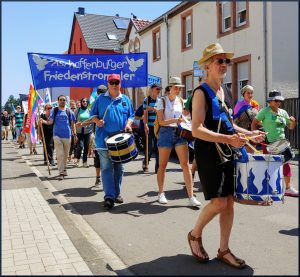 There were about 300 of us activists, and maybe 10 police cars and wagons, plus an ambulance. Activists here are really well organized. They had set up a stage with a wicked sound system, lots of banners, creative signs and a really good number of young folks. After the speeches, music and chanting, the two people with the lead banner took to the streets, starting the roughly 3-mile march to the base, which plays a key role in the Pentagon’s global program of drone warfare.
There were about 300 of us activists, and maybe 10 police cars and wagons, plus an ambulance. Activists here are really well organized. They had set up a stage with a wicked sound system, lots of banners, creative signs and a really good number of young folks. After the speeches, music and chanting, the two people with the lead banner took to the streets, starting the roughly 3-mile march to the base, which plays a key role in the Pentagon’s global program of drone warfare.
We worked our way through the narrow, winding city streets, with four drummers in the front beating out a rhythm that echoed off the walls of the houses on either side of us. In a short time the numbers had swelled to about 800.
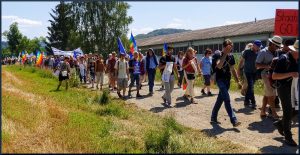 Leaving the city, we marched on a side road next to the highway leading to the base, and then onto a dirt road through woods and farmlands. Two cops proceeded the march on foot, the only real police presence at this point.
Leaving the city, we marched on a side road next to the highway leading to the base, and then onto a dirt road through woods and farmlands. Two cops proceeded the march on foot, the only real police presence at this point.
The day was getting hot. Not as bad as late summer in Richmond, but after a mile or so you began to feel it. But being with all these enthusiastic activists took the edge off the heat. Getting closer to the base, we came up on a small monument displaying what I think were names of service people attached to the base who had died, I assume in combat. The chanting stopped and people slowly filed by to pay their respects, as one drummer kept a low roll going.
Then it was the final stretch across a field, up a small hill and onto a paved area next to the road that led to the base. Here another stage had been set up, with more speeches and music. By now the crowd was in the thousands.
I thought I was doing fine, but all of a sudden the heat got to me and I had to find a shaded spot by the road to sit down. I was kind of wiped, staring down at the pavement, when someone standing over me said something in German. I looked up, and this tall, portly, white-bearded man with granny glasses and twinkly eyes was offering me a bottle of water. “It’s Christmas!” I thought, thanking him with my best German word: Danke!
Refreshed, I headed back over to the stage and noticed there were people on the side of the main road, sitting down at an intersection. This was the promised blockade of the road leading to the base! Edging around the police who now lined the area, I went over to take some photos.
It turned out there were actually two blockades. I think the one I was at was the smaller of the two, but still about 60 people, most sitting cross-legged as a line of maybe 20 cops faced them. Most of those sitting down were young, but there were some elders among them too.
After I got my photos, I joined the group sitting in the road. One young German women behind me spoke English and was kind enough to translate the chants for me. The most common one was “Stop Ramstein base!” (Guess I could have figured out that one myself.) Also some militant-sounding songs I would have liked to have learned – a great souvenir. One guy walked up and down the line with a spray water bottle misting people – and my cellphone, which fortunately is water-resistant. Another guy asked me to take his photo and then reciprocated by taking mine. For people about to get arrested, we were in pretty good mood.
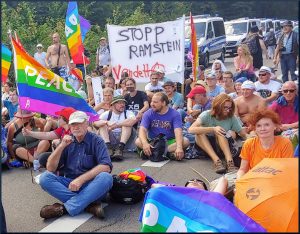 Then I heard somebody announcing what sounded like police-speak over a bullhorn and was told we were getting our first warning: stand up and leave the road, or face arrest. No one moved. Some time later, the warning was repeated. A few got up, explaining to others their reasons, mostly jobs or family obligations.
Then I heard somebody announcing what sounded like police-speak over a bullhorn and was told we were getting our first warning: stand up and leave the road, or face arrest. No one moved. Some time later, the warning was repeated. A few got up, explaining to others their reasons, mostly jobs or family obligations.
Then a man I didn’t recognize announced that the blockade was over and we should all leave. My German is pretty much restricted to “hi,” “bye,” coffee with milk, please” and “where’s the bathroom,” but again, other folks translated.
At this point almost all of the protesters got up to leave. I wasn’t sure what to do. The organizers had said that part of the day’s protest was going to be a blockade of the road leading to the base, and there had been training in civil disobedience tactics for those willing to be arrested. I later learned that a similar announcement had been made at the other blockade, and also from the stage.
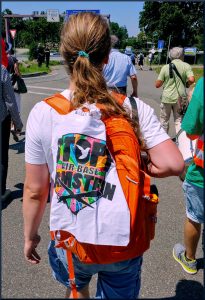 At the other blockade, about 30-40 people evidently had decided to stay. Most were German citizens, which meant they would have to show identification on the spot and would then receive a citation. Foreigners were a different story, so i knew I was facing some detention – a few hours I had been told, and possibly a fine.
At the other blockade, about 30-40 people evidently had decided to stay. Most were German citizens, which meant they would have to show identification on the spot and would then receive a citation. Foreigners were a different story, so i knew I was facing some detention – a few hours I had been told, and possibly a fine.
The young German woman behind me said this was her second protest at Ramstein, but her first blockade, and said she was staying if I was. A guy in front of us was making it clear he was staying. I wasn’t sure about a few others milling around, but decided I had come this far, was representing the United National Antiwar Coalition and should see the thing through. (Besides, I hadn’t been arrested since April 3, 2011, when eight Defenders and friends blockaded the VCU parking lot that sat over the African Burial Ground, so I was overdue.)
Finally two cops came up to the young woman and me and asked us to leave. Asked really nicely. Kind of pleaded, actually. They were young and very respectful and I almost felt bad for them as we explained that this was a conscious decision to at least symbolically obstruct traffic into the base that relays attack orders from “pilots” in the States to deadly drone bases around the world.
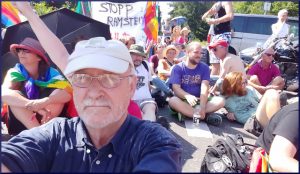 Finally they got it that we weren’t leaving on our own. I looked over and the guy in front of us had gone limp on the ground and was being carried off. Of course, that was the photo that appeared the next day in the local newspaper. I’m really not much on passive resistance, so I got walked off between two officers, as did the young woman.
Finally they got it that we weren’t leaving on our own. I looked over and the guy in front of us had gone limp on the ground and was being carried off. Of course, that was the photo that appeared the next day in the local newspaper. I’m really not much on passive resistance, so I got walked off between two officers, as did the young woman.
In the nearby crowd was former U.S. Army colonel and now well-known antiwar activist Ann Wright, who smiled broadly, pumped her fist and took some photos. I don’t know how many times I’ve seen Ann arrested, or read about her daring exploits on peace missions to Gaza and other dangerous places, so I felt pretty humbled by her support. (She had other commitments, or else would have been arrested this time too.)
So the three of us – me, the young woman and the guy who turned out to be from Switzerland, all got taken off to the side of the main road, were told to empty our pockets and got our pictures taken – front and back. I guess that was so if we ever try to break the law in Germany again, while walking backwards, they’ll be able to recognize us.
Then, because the Swiss guy and I were foreign nationals, we got taken by police wagon into town to the local police station. (Please don’t call them “paddy” wagons – that’s a slur against the Irish, which my mother, among other people, would resent,) It had a small booth inside, just large enough for a seat, with your knees touching the wall in front. Kind of like flying economy. Except the window was smaller. One cop closed the metal door, then opened it again and said, “It’s hot. I’ll let you have a little breeze until we leave.” Danke.
Truthfully, this was the easiest bust I’ve ever had, and I’m now up to Number 8. All the cops were very respectful, like they were dealing with a real human being who should be treated with at least a minimum of respect. I’ve been arrested in Norfolk for objecting to the way a cop was manhandling a young Black woman – a Panther – where two cops came to my cell to insult me. I got nailed in Detroit, putting up posters on city poles, where a cop stood in the processing room playing with his gun while eyeing the lot of us. A small youthful indiscretion in New York City that’s now legal in about 11 states got me a night in the “Tombs,” so-called because, for want of $50 bond money, a lot of people spent months there waiting for trial.
I’m not saying the police were congratulating us, but I actually had a real conversation with about five of them, explaining why, as an “American,” I felt it important to join with German antiwar activists to protest the presence of a massive U.S. military base on their soil, one that has played a key role in killing thousands of innocent people, so-called “collateral damage” in Pentagon language.
“Yeah, but you made your point,” one cop said. “Then you should have gotten up and left and not broken the law.”
“But of course you would say that,” I said. “You’re a cop! And I’m an activist” He actually laughed.
Then it was down to the station where they asked me to write a statement describing my crime. “And don’t write a book!” a woman cop said, after I had verbally tried to explain the philosophy behind civil disobedience.
CD is a particular kind of lawbreaking. Usually my own philosophy is do what you think you need to do and try your best to get away with it. But with CD, you’re making a political point. When we blockaded the entrance to the VCU parking lot in 2011, so many people had already explained the significance of the African Burial Ground to so many other people that there was a lot of public support for the action. More than 60 people attended our trial. The Richmond Free Press ran a very laudatory editorial. And VCU wisely decided to withdraw the trespassing charges – and remove the offending parking lot in a matter of weeks, instead of the more-than-six months that they had previously said was their intention. So that time breaking the law in an open, public way was an effective tactic.
This time, it was simply taking a moral stand. When I read stories, even in the Richmond Times-Dispatch, about some drones bombing what turned out to be a wedding party or funeral with scores of innocent women, men and children getting torn apart, I felt like I did back in the 60’s when I saw photos of Vietnamese children who had been burned with napalm. It makes me mad. I really, really hate bullies, and the U.S. government is the biggest bully ever. So you have to do something, even if it’s only symbolic. As the old AIDS movement used to say, “Silence = Death.”
Anyway, the cops finally explained that I had to pay a “processing fee” for all the paperwork my sitting in the road had caused. The damage was 200 euros, or about $234.00. Then two of them escorted me across the street to an ATM machine.
And then I was shown the door, with the woman cop saying, “Have nice weekend.”
And just outside was Toby, an anti-drone activist from California who also had taken an arrest, and the guy from Switzerland. There was a dive working-class bar around the corner with a little patio out front and in a few minutes we were paying our respects to the great German beer tradition.
“Is this your first time in our town?” the waitress asked pleasantly.
“It’s my first time in Germany,” I said.
“And what brought you here?” she asked.
“We were out protesting at the base,” I said. “We just got out of jail.”
She looked at me kind of funny. After all, this is a military town that depends on the huge base for jobs and business. But as a former cab driver, I tip well, so after the third beer we were back in her good graces.
Finally we headed back to the peace camp, a collection of scores of RVs, tents and temporary shelters where a lot of the activists had been staying. There was a meeting with a lawyer for the people who had refused to leave the blockade. I got invited to say a few words, so I praised the whole day, the large turnout, and the blockade that had lasted about an hour.
So that was my visit to Germany. The next day I was on a high-speed train hurtling across the German countryside on my way to Vienna, Austria, to meet with some peace activists there who, like UNAC, work in support of the anti-fascist movement in Ukraine.
In a few more days I’ll be in Brussels, Belgium, for two conferences and a big march against the annual NATO Summit that the warmongers are holding in their brand-new, multi-million dollar headquarters. If only all the billions and trillions spent around the world on war preparations, war machines and war itself, most of it by the U.S., could be spent on helping people instead of killing them, what a wonderful world we could have.
A thought worth sitting in the road for, I think.
Thanks,
Phil
Note: If you’d like to help support this journey for peace, you can make a financial contribution of any size at this GoFundMe site.
You can find more information at:
United National Antiwar Coalition
Stop Air Base Ramstein
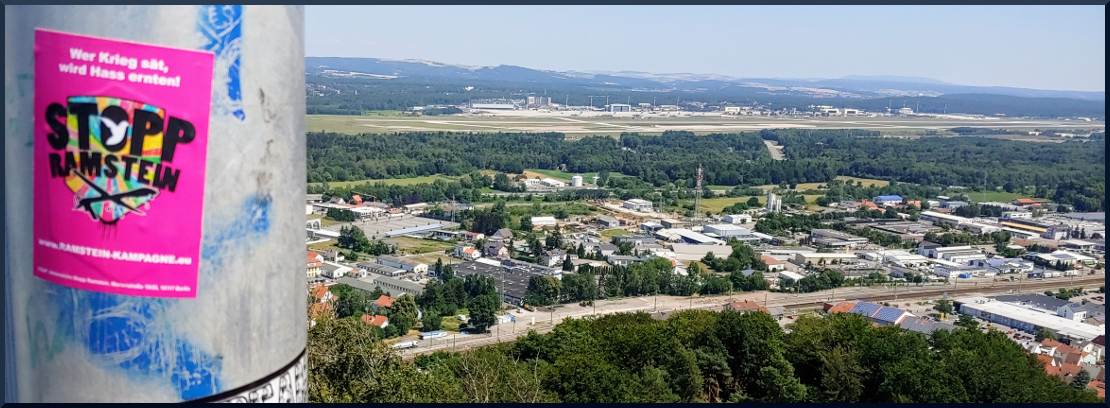
3 comments